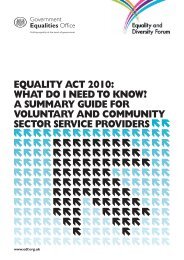Equality Act 2010: Public Sector Equality Duty what do I need to know?
Equality Act 2010: Public Sector Equality Duty what do I need to know?
Equality Act 2010: Public Sector Equality Duty what do I need to know?
- No tags were found...
You also want an ePaper? Increase the reach of your titles
YUMPU automatically turns print PDFs into web optimized ePapers that Google loves.
Implementing the <strong>Equality</strong> <strong>Duty</strong><strong>Public</strong> bodies <strong>need</strong> <strong>to</strong> consciously think aboutthe three aims of the <strong>Equality</strong> <strong>Duty</strong> as part of theprocess of decision-making. The <strong>Equality</strong> <strong>Duty</strong> willbe one of a number of fac<strong>to</strong>rs that <strong>need</strong> <strong>to</strong> beconsidered. The weight given <strong>to</strong> the <strong>Equality</strong> <strong>Duty</strong>,compared <strong>to</strong> the other fac<strong>to</strong>rs, will depend on howmuch that function affects discrimination, equalityof opportunity and good relations and the extent ofany disadvantage that <strong>need</strong>s <strong>to</strong> be addressed.The following principles, drawn from case law,explain <strong>what</strong> is essential in order for the <strong>Equality</strong><strong>Duty</strong> <strong>to</strong> be fulfilled. <strong>Public</strong> bodies should ensure:Knowledge – those who exercise the public body’sfunctions <strong>need</strong> <strong>to</strong> be aware of the requirements ofthe <strong>Equality</strong> <strong>Duty</strong>. Compliance with the <strong>Equality</strong> <strong>Duty</strong>involves a conscious approach and state of mind.Timeliness – the <strong>Equality</strong> <strong>Duty</strong> must be compliedwith before and at the time that a particular policyis under consideration or decision is taken – that is,in the development of policy options, and in makinga final decision. A public body cannot satisfy the<strong>Equality</strong> <strong>Duty</strong> by justifying a decision after it hasbeen taken.Suffcient information – the decision makermust consider <strong>what</strong> information he or she has and<strong>what</strong> further information may be <strong>need</strong>ed in order <strong>to</strong>give proper consideration <strong>to</strong> the <strong>Equality</strong> <strong>Duty</strong>.No delegation – public bodies are responsiblefor ensuring that any third parties which exercisefunctions on their behalf are capable of complyingwith the <strong>Equality</strong> <strong>Duty</strong>, are required <strong>to</strong> comply withit, and that they <strong>do</strong> so in practice. It is a duty thatcannot be delegated.Review – public bodies must have regard <strong>to</strong> theaims of the <strong>Equality</strong> <strong>Duty</strong> not only when a policyis developed and decided upon, but also when it isimplemented and reviewed. The <strong>Equality</strong> <strong>Duty</strong> is acontinuing duty.Demonstrating compliance with the<strong>Equality</strong> <strong>Duty</strong>There is no explicit requirement <strong>to</strong> refer <strong>to</strong>the <strong>Equality</strong> <strong>Duty</strong> in recording the process ofconsideration but it is good practice <strong>to</strong> <strong>do</strong> so.Keeping a record of how decisions were reached willhelp public bodies demonstrate that they consideredthe aims of the <strong>Equality</strong> <strong>Duty</strong>.Real consideration – consideration of the threeaims of the <strong>Equality</strong> <strong>Duty</strong> must form an integral par<strong>to</strong>f the decision-making process. The <strong>Equality</strong> <strong>Duty</strong>is not a matter of box-ticking; it must be exercisedin substance, with rigour and with an open mind insuch a way that it influences the final decision.5







